#Myriel
Explore tagged Tumblr posts
Text
Jean Valjean receives a candlestick from the Bishop despite stealing his silvers, 京剧 悲惨世界 (2006)
#les mis#京剧 悲惨世界#china#chinese#jean valjean#myriel#jean valjean and myriel#baptistine#or is it magloire?
40 notes
·
View notes
Text
Today is Miriel from Fire Emblem Awakening's birthday!

46 notes
·
View notes
Text
this is definitely a digression, but in addition to everything else, 1.2.13 seems very much like a tale of two priests: Bishop Myriel and the nameless priest on a horse.
Priest-on-a-horse is not an actively malicious guy! He just sort of doesn't care. He says, offhand, about Petit-Gervais: "He is a little stranger. Such persons pass through these parts. We know nothing of them." And when a hysterical Valjean says something that alarms him, he races off. He wants to "know nothing" of strangers passing through; he is unwilling to risk his own comfort or safety to help.
This seems like a pretty deliberate nod to the Bad Priest of the parable of the Good Samaritan, who "happened to be going down the same road, and when he saw the man [in need], he passed by on the other side." Not a man he knew; unpredictable and distressed; ignorable. (Hugo is really not subtle on this point; see also Jesus, saying "Depart from me, you who are cursed, [because] I was a stranger and you did not welcome me.")
Myriel is only present in Valjean's memory. But the memory of Myriel's care and mercy toward him, a stranger, a criminal, is so transformative for Valjean that Myriel is raised into the place of Christ in his mind. Parts of this chapter read like the very best of conversion literature — Saul blinded, Augustine turning — with the Bishop quite literally acting in persona christi.
"As the Bishop grew great and resplendent in his eyes, so did Jean Valjean grow less and vanish. After a certain time he was no longer anything more than a shade. All at once he disappeared. The Bishop alone remained; he filled the whole soul of this wretched man with a magnificent radiance."
compare Colossians 3:3: "For you have died, and your life is hidden with Christ in God. When Christ who is your life appears, then you also will appear with him in glory."
just an extremely neat contrast here, the nameless erasure of the priest who knew nothing of the stranger, the hagiographic elevation of the priest who, despite all his faults, welcomed and fed and forgave Jean Valjean.
#wow long post sorry!#theology stuff is gonna be tagged as follows if anyone wants to block it btw!#christianity tag#les mis letters#les mis#lm 1.2.13#quotes are nrsv btw#victor hugo#mine#jvj#myriel#in many ways I-II are rly just a long defense of that old line about the priest being themself a sacrament.#not all the time. not without being human. but still. moments where it shines thru the skin#hey on that note. victor hugo do you want to talk about the priesthood of all believers. victor hugo i'm serious --#bible tag
28 notes
·
View notes
Text
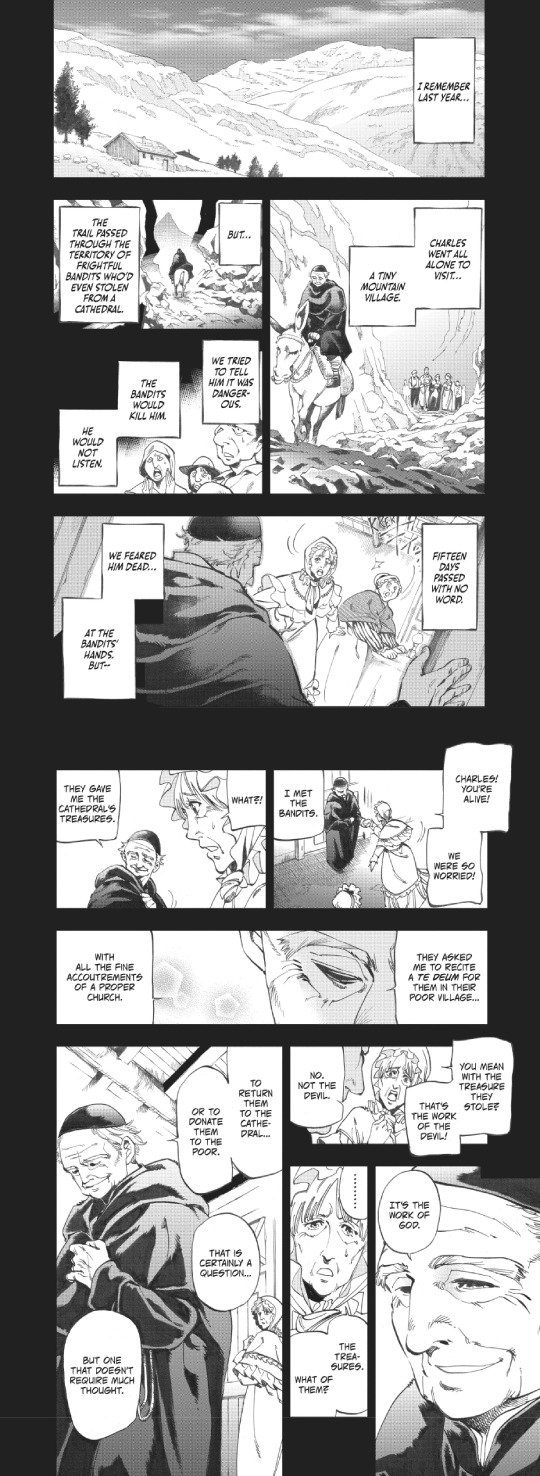
LES MIS LETTERS IN ADAPTATION - Cravatte, LM 1.1.7 (Les Miserables - Takahiro Arai)
He would take neither his sister nor Madame Magloire. He traversed the mountain on mule-back, encountered no one, and arrived safe and sound at the residence of his “good friends,” the shepherds. He remained there for a fortnight, preaching, administering the sacrament, teaching, exhorting. When the time of his departure approached, he resolved to chant a Te Deum pontifically. He mentioned it to the curé. But what was to be done? There were no episcopal ornaments. They could only place at his disposal a wretched village sacristy, with a few ancient chasubles of threadbare damask adorned with imitation lace. “Bah!” said the Bishop. “Let us announce our Te Deum from the pulpit, nevertheless, Monsieur le Curé. Things will arrange themselves.” They instituted a search in the churches of the neighborhood. All the magnificence of these humble parishes combined would not have sufficed to clothe the chorister of a cathedral properly. While they were thus embarrassed, a large chest was brought and deposited in the presbytery for the Bishop, by two unknown horsemen, who departed on the instant. The chest was opened; it contained a cope of cloth of gold, a mitre ornamented with diamonds, an archbishop’s cross, a magnificent crosier,—all the pontifical vestments which had been stolen a month previously from the treasury of Notre Dame d’Embrun. In the chest was a paper, on which these words were written, “From Cravatte to Monseigneur Bienvenu.” “Did not I say that things would come right of themselves?” said the Bishop. Then he added, with a smile, “To him who contents himself with the surplice of a curate, God sends the cope of an archbishop.” “Monseigneur,” murmured the curé, throwing back his head with a smile. “God—or the Devil.” The Bishop looked steadily at the curé, and repeated with authority, “God!” When he returned to Chastelar, the people came out to stare at him as at a curiosity, all along the road. At the priest’s house in Chastelar he rejoined Mademoiselle Baptistine and Madame Magloire, who were waiting for him, and he said to his sister: “Well! was I in the right? The poor priest went to his poor mountaineers with empty hands, and he returns from them with his hands full. I set out bearing only my faith in God; I have brought back the treasure of a cathedral.”
#Les Mis#Les Mis Letters#Les Mis Letters In Adaptation#Les Miserables#LM 1.1.7#Myriel#Bishop Myriel#M. Myriel#Baptistine Myriel#Madame Magloire#Les Mis Arai#Les Miserables Arai#lesmisedit#lesmiserablesedit#lesmisaraiedit#lesmiserablesaraiedit
22 notes
·
View notes
Text

French postcard by Croissant, Paris, no. 3664. Photo: Film Pathé. Publicity still for Le chemineau/The Tramp (Albert Capellani, 1905), based on the first part of 'Les misérables' in which Jean Valjean, who was granted lodging by the parish priest of a village, stole several silver candlesticks and escapes the arrest thanks to the false testimony of the priest. Unclear is who the actors are, but the sets were by Hugues Laurent. The film appeared in the 'Scènes dramatiques et réalistes (8ème Série)' by Pathé.
Source
20 notes
·
View notes
Text
The Bishop in the Presence of an Unknown Timeline
David Montgomery, illustrious creator of The Siecle (gooooo go listen to it, read the transcripts, it's SO good) , today laid out the necessary historical timeline for the Bishop's visit to the Conventionist! I am copying that over here with permission:
Alright, I have consulted my sources and have interesting findings about the chronology of the Myriel chapters. Chapter X includes the following lines, reflecting popular comments about the Conventionist in town: He was a quasi-regicide. He had been a terrible man. How did it happen that such a man had not been brought before a provost’s court, on the return of the legitimate princes? ... As he had not voted for the death of the king, he had not been included in the decrees of exile, and had been able to remain in France. This references two things: the "provost's court" and the "decrees of exile." Both are real historical things, and both can be dated fairly precisely. The "decrees of exile" could refer to several different things. Promptly upon Louis XVIII's return after Waterloo, he issued a July 24, 1815 blanket amnesty for crimes committed during the Hundred Days — but exempted 56 Bonapartists from pardon. Most were allowed to (encouraged to, even) slip out of the country, where they had to remain for fear of prosecution for treason. But I think this most likely refers to another law, passed on January 12, 1816. This Amnesty Law (subject of fierce negotiations between the ministry and parliament, related mostly to whether it infringed on the king's prerogative of pardon and his July 24 amnesty decree) ultimately exiled the hard-core Bonapartists targeted by the July 24 decree, and also all Regicides who had sided with Napoleon during the Hundred Days. (Regicides who had stayed loyal were not banished.) Provost Courts were special tribunals where military provosts acted as accuser and prosecutor before a panel of civilian judges. Their was no jury, no appeal, and judgment (including death) was carried out within 24 hours. These had existed under Napoleon, but were abolished in 1814 at the First Restoration. Article 63 of Louis XVIII's "Charter of 1814" reads: "...extraordinary commissions and tribunals cannot be created. Provost-courts are not included under this denomination, if their re-establishment is deemed necessary." After Waterloo, the Provost Courts were re-created to deal with political criminals — seditious meetings, rebellion, and threats against the government and royal family. Crucially, however, the Provost Courts were re-established by a law of December 27, 1815. Given the textual references, if one assumes a realistic timeline and no authorial error, then Chapter X could not have taken place before January 1816, and likely (given that the exile decrees and provost courts are discussed in the past and not present tense) at least some time after that date. Sources: Mansel, Philip. Louis XVIII. Rev. ed. Phoenix Mill: Sutton, 1999. Sauvigny, Guillaume de Bertier de. The Bourbon Restoration. Translated by Lynn M. Case. Philadelphia: The University of Pennsylvania Press, 1966. The Charter of 1814: https://en.wikisource.org/wiki/French_Constitutional_Charter_of_1814
#Les Mis Letters#LM 1.1.10#The Conventionist#!!!#Myriel#David Montgomery#long post#I have tried to Repair formatting but tumblr only allows so much ><
34 notes
·
View notes
Text
Les Misérables 1.1.4 - Works Answering Words (Part 2)
Okay, now that I’ve gotten the tax policy stuff of my chest, I do have other thoughts on this chapter.
I love the bishop’s pun on ‘Votre Grandeur’ (which works better in French, where ‘grand’ actually does mean ‘tall’, than it does in English). He doesn’t like being called honorifics (see his line ‘Bienvenu counterbalances Monseigneur’), so if Mme. Magloire insists on calling him that all the time, he’s going to make light of it when he gets the chance. I think his tendency to respond to feeling annoyed or frustrated by using humour rather than by displaying anger or aggravation is also manifested in his latter two lines, about the countess and the miser.
I love the line:
As we can see, he had a strange and peculiar way of judging things. I suspect that he acquired it from the Gospel.
The part about the executed man made me think of one particular thing. What the bishop did is exacly what a good bishop is supposed to do - he gave the man spiritual counsel, gave him hope, enabled him to repent and trust in God’s mercy. I thought at first that the bishop’s being overwhelmed afterwards was due to trauma - he likely had friends and family who died at the guillotine, even if he did not see it. But in fact it is something different: after the fact, he reproaches himself. Likely he asks himself: this man has been granted mercy by God; what right then had human power to refuse it to him? Perhaps he no longer sees his presence at the guillotine as a good act, but as implicitly sanctioning something that ought not to have been sanctioned.
20 notes
·
View notes
Text





Les Simserables - Digne
Now known as Digne-les-Bains or Dinha dei Banhs in Occitan. Located in the mountainous areas of southeastern France, with a more mediterranean architecture. The Digne Cathedral, officially the Cathédrale Saint-Jérome de Digne, was constructed in the late 15th century and would have been in use when Myriel was the bishop, though it didn't look quite the same as it was extended and given a new facade in the 1860s.
11 notes
·
View notes
Text
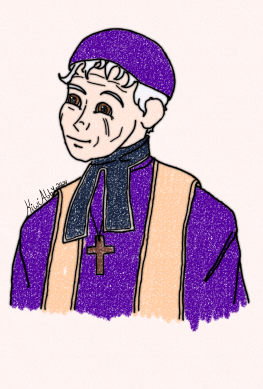
"M. Myriel had to undergo the fate of every newcomer in a little town, where there are many mouths which talk, and very few heads which think." - Les Miserables, 1.1.1
10 notes
·
View notes
Text

"Come with me, won't you?"
Had fun trying to emulate the style of nounknown, who does the art for KairikiBear's music! Had a lot of fun but it was a lot of work.
2 notes
·
View notes
Text
I call this a fever dream Les Misérables

^ Evil Jean Valjean turns the Bishop turns into a set of silvers

^ Two Bishops turn into a set of silvers with no context

^ Four Bishops turn into silverware
17 notes
·
View notes
Text

"I wish to write bl about parisian sewer system," victor hugo (1862), probably
#les mis#les miserables#victor hugo#enjoltaire#les amis de l'abc#les amis#valvert#montparnasse#combeferre#bishop myriel#marius pontmercy#the brick#i support 'enjolras is literally apollo' but lemme up the stakes and offer you 'ferre is literally athena'
2K notes
·
View notes
Text

hello enjoltaire nation, today I give you another offering
#les mis#enjolras#grantaire#enjoltaire#exr#one of my favourite quotes tbh#this and bishop myriel's blind quote?? exquisite. give me more#haterart
2K notes
·
View notes
Text
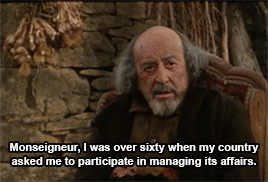
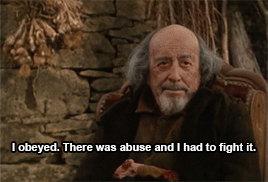





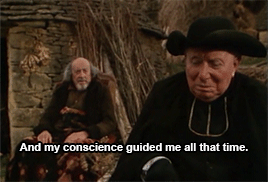
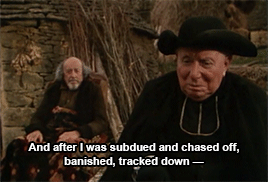
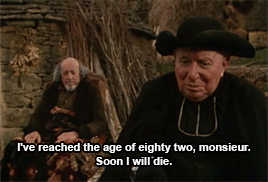
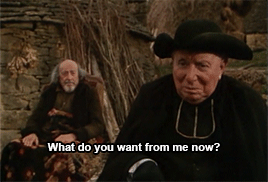
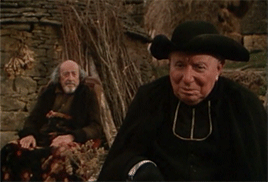
LES MIS LETTERS IN ADAPTATION - The Bishop in the Presence of an Unknown Light, LM 1.1.10 (Les Miserables 1982)
“Bishop,” said he, with a slowness which probably arose more from his dignity of soul than from the failing of his strength, “I have passed my life in meditation, study, and contemplation. I was sixty years of age when my country called me and commanded me to concern myself with its affairs. I obeyed. Abuses existed, I combated them; tyrannies existed, I destroyed them; rights and principles existed, I proclaimed and confessed them. Our territory was invaded, I defended it; France was menaced, I offered my breast. I was not rich; I am poor. I have been one of the masters of the state; the vaults of the treasury were encumbered with specie to such a degree that we were forced to shore up the walls, which were on the point of bursting beneath the weight of gold and silver; I dined in Dead Tree Street, at twenty-two sous. I have succored the oppressed, I have comforted the suffering. I tore the cloth from the altar, it is true; but it was to bind up the wounds of my country. I have always upheld the march forward of the human race, forward towards the light, and I have sometimes resisted progress without pity. I have, when the occasion offered, protected my own adversaries, men of your profession. And there is at Peteghem, in Flanders, at the very spot where the Merovingian kings had their summer palace, a convent of Urbanists, the Abbey of Sainte Claire en Beaulieu, which I saved in 1793. I have done my duty according to my powers, and all the good that I was able. After which, I was hunted down, pursued, persecuted, blackened, jeered at, scorned, cursed, proscribed. For many years past, I with my white hair have been conscious that many people think they have the right to despise me; to the poor ignorant masses I present the visage of one damned. And I accept this isolation of hatred, without hating any one myself. Now I am eighty-six years old; I am on the point of death. What is it that you have come to ask of me?” “Your blessing,” said the Bishop.
#Les Mis#Les Miserables#Les Mis Letters#Les Mis Letters in Adaptation#LM 1.1.10#The Conventionist#M. Myriel#Bishop Myriel#Myriel#lesmisedit#lesmiserablesedit#lesmis1982edit#lesmiserables1982edit#pureanonedits#Les Mis 1982#Les Miserables 1982
86 notes
·
View notes
Text
The people of Digne when they saw Bishop Bienvenu living in the hospital, riding a donkey, wearing out his cassock, etc:

72 notes
·
View notes
Text

I think he’s gonna be fine you guys
360 notes
·
View notes